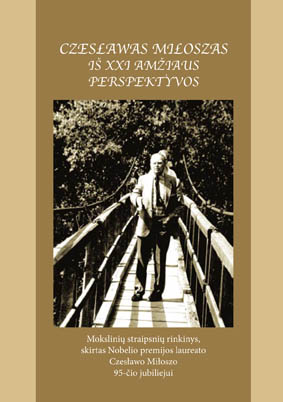Teksto strategija Czesławo Miłoszo ir Vladimiro Nabokovo eseistikoje
Czesław Miłosz and Vladimir Nabokov: Watching Text
Author(s): Asija KovtunSubject(s): Literary Texts
Published by: Vytauto Didžiojo Universitetas
Keywords: Czesław Miłosz; Vladimir Nabokov; konferencija; conference; Kaunas
Summary/Abstract: The space of text always unites cultural, social, linguistic and mental features of its creator. “There is nothing beyond text” – this idea of Jacques Derrida is the fundamental one for the novel text reflection. Author and reader’s intellectual communi cation has become an essential point in contemporary text stra tegy. The meaning here does not carry a single sense but offers a research strategy of “multiple ways of meaning creation”. The text aims at two goals: a dialogue between the rea der and the author, and the author’s conver sation with himself, leading, thus, to the text personification. The personification range can be exceptionally wide – from the aut hor’s ultimate feeling through the text to the aut hor’s total breakaway. Essayism is a special quality of contemporary culture. The union of philosophy, literature and science can be argued to be present here. Czesław Miłosz and Vladimir Nabokov were the most prominent essayists of the last century. Their aesthetics is based on the interaction of a personality with a self identifying word, where self-identification should be treated as movement towards the discovery of sense. The method and quality of the essayism of Czesław Miłosz and Vladimir Nabokov can be related to the ideas of deconstruction, the issues of sign, language and text., where even the marginal points reflect the union of the author and his text. Deconstructive reading of the text “The Roadside Dog” by Czesław Miłosz presumes the liberation of multiple meanings and their shades. The genre of essay for Czesław Miłosz is a possibility for considering the multiple meaning of the world as well as the multiplicity of its forms for the search for truth. Czesław Miłosz elaborates on the essay language as a conceptualization means: he sees the understanding of language as one of the core intellectual concepts of contemporary culture. The author takes the sign as an autonomous reality with its inner structure. Any text is word shaped and exists “in itself and for itself”. The separation of word and object peculiar to the 20th century culture is treated by Czesław Miłosz as controversial and “dangerous” to the signified world in the first place, for objects get dissolved within their functional representations An example of this particular strategy formation can be Vladimir Nabokov’s es say “Lectures on Russian Literature” where the author strives to optimize the sense of his text and the subjectivity of the artist acquires independent creative meaning. Nabokov makes presuppositions on his reader’s knowledge level and his/her preparedness for creative work. Multiple meaningful layers of sense provide the conditions for essayistic creativity. Art for Na bokov is a divine game. The two elements, divi nity and game, are taken as sides of equal value. In the syncretic world of Nabokov, traditional words gain special light, which discloses Russian literature in a new way.
Journal: Česlovo Milošo skaitymai
- Issue Year: 2007
- Issue No: 1
- Page Range: 182-196
- Page Count: 15
- Language: Lithuanian

